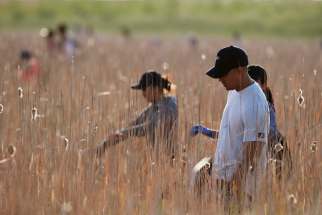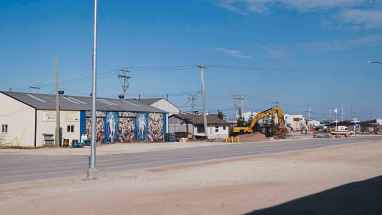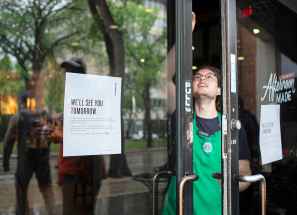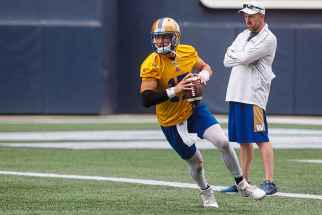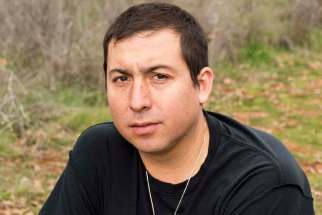Local Starbucks employees go through anti-bias training
Read this article for free:
or
Already have an account? Log in here »
To continue reading, please subscribe:
Monthly Digital Subscription
$0 for the first 4 weeks*
- Enjoy unlimited reading on winnipegfreepress.com
- Read the E-Edition, our digital replica newspaper
- Access News Break, our award-winning app
- Play interactive puzzles
*No charge for 4 weeks then price increases to the regular rate of $19.00 plus GST every four weeks. Offer available to new and qualified returning subscribers only. Cancel any time.
Monthly Digital Subscription
$4.75/week*
- Enjoy unlimited reading on winnipegfreepress.com
- Read the E-Edition, our digital replica newspaper
- Access News Break, our award-winning app
- Play interactive puzzles
*Billed as $19 plus GST every four weeks. Cancel any time.
To continue reading, please subscribe:
Add Free Press access to your Brandon Sun subscription for only an additional
$1 for the first 4 weeks*
*Your next subscription payment will increase by $1.00 and you will be charged $16.99 plus GST for four weeks. After four weeks, your payment will increase to $23.99 plus GST every four weeks.
Read unlimited articles for free today:
or
Already have an account? Log in here »
Hey there, time traveller!
This article was published 11/06/2018 (2738 days ago), so information in it may no longer be current.
All 1,100 Starbucks locations in Canada closed Monday afternoon while employees received mandatory anti-bias training, a decision the company made after the manager of a Philadelphia store called police on two Black men who were at the coffee shop waiting for a friend in April.
“The reprehensible event in Philadelphia prompted us to reflect, and led to this day,” Starbucks Canada president Michael Conway wrote in an open letter.
After the two Philadelphia men, Donte Robinson and Rashon Nelson, arrived, they asked to use the bathroom and were told it was only for customers. When they declined to order, police were called, and the men were led out of the restaurant and arrested. Video of the incident circulated and led to calls for boycotts of the company, which later offered the men a settlement. On May 29, 8,000 American Starbucks were closed for sensitivity training.
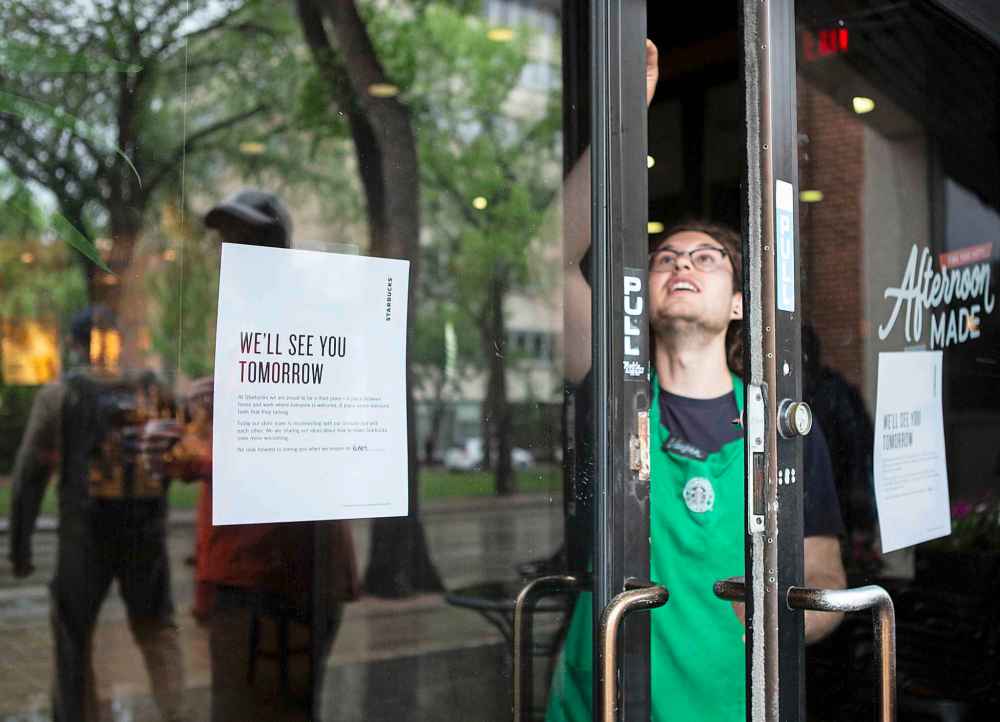
In a media sneak peek of the training, the Seattle-based company said the sessions will begin with a video message from Conway, where he notes that “you may think this does not relate to us in Canada, but it does. The world is changing and we are not immune to the complexities or biases and neither are our customers or our communities.”
Conway said Starbucks locations grapple with issues around homelessness, language barriers and “Canadians that simply appear very different from one of us,” but he believes the training will “only strengthen our resolve to make sure every customer feels welcome every time.”
Following his introduction, employees will break into groups of between three and five people to go through a 68-page book of exercises.
The materials ask employees to discuss the first time they noticed their “racial identity,” “had a friend of a different race who regularly visited your home,” “felt distracted at work because of external events related to race,” and “went to work with your natural hair without comments or questions from others.”
The training discusses different types of bias, including systemic and implicit, and situational videos with titles like “Woman in dirty sweatpants lingering near the retail cups.” The excerise book references biases against Black people, but doesn’t refer directly to bias against other people of colour — including Indigenous people — LGBTQ people, or people living with disabilities.
Mary Jane Logan McCallum, a professor at the University of Winnipeg focusing on modern Indigenous history, says bias training is framed to allow people to open up about their biases, but often caters to a normative white viewpoint, even if the training is designed to make the experiences of people of colour more visible.
Alexa Potashnik, the president and founder of Black Space Winnipeg, an organization that advocates for the city’s Black community, wasn’t surprised to see the arrest in Philadelphia. “It was unfortunate that it happened, but it happens more than we think.”
In Potashnik’s experience, people of colour often face negative encounters with authorities that either isn’t seen or is ignored. While she understands the need for the training, Potashnik thinks it should have happened before an issue arose, not after.
“I think it’s a little too late,” she said. “I don’t think this would’ve happened without the media coverage and backlash from the Black community at large.”
Barbara Bowes, a Winnipeg-based human resources specialist, said bias training can be effective, however, no one-day session can guarantee institutional change.
“Sensitivity training is all well and good, but it has to be an ongoing cultural and organizational shift,” said Bowes, who writes a weekly column on HR and other matters for the Free Press. “Training in isolation doesn’t work. You need follow-up, or else it will fall by the wayside,” she said. Companies shouldn’t wait until there’s a public issue in order to institute these changes, she added.
Cheryl Reddick, 45, left an Osborne Village Starbucks around 2:30 p.m. Monday, just as staff were beginning to close.
Reddick, who lives in Kenora, was saddened that the training was even necessary. “As a person of colour, I do get treated differently, but I haven’t had any negative experiences personally at Starbucks.” But the issue of racial bias or prejudice isn’t limited to Starbucks, she said. “It happens everywhere, all the time.”
As Potashnik puts it, “It’s going to take more than sensitivity training to change the culture.”
“If it wasn’t caught on camera, where would this situation be?”
— With files from Canadian Press
bwaldman@freepress.mb.ca
Twitter: @benjwaldman

Ben Waldman covers a little bit of everything for the Free Press.
Our newsroom depends on a growing audience of readers to power our journalism. If you are not a paid reader, please consider becoming a subscriber.
Our newsroom depends on its audience of readers to power our journalism. Thank you for your support.

